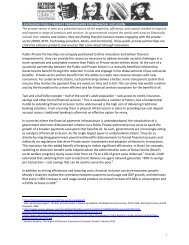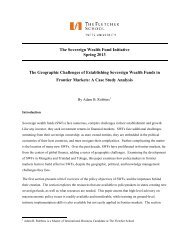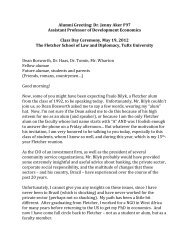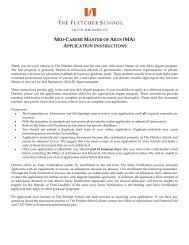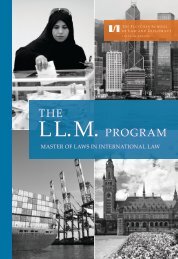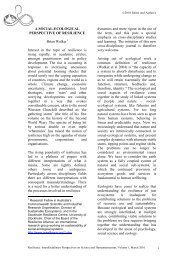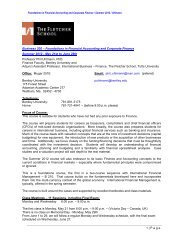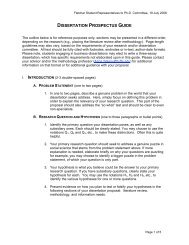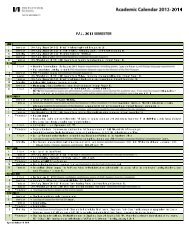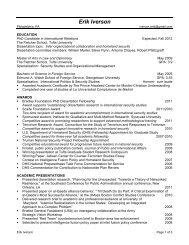Threaten but Participate: - Brookings Institution
Threaten but Participate: - Brookings Institution
Threaten but Participate: - Brookings Institution
Create successful ePaper yourself
Turn your PDF publications into a flip-book with our unique Google optimized e-Paper software.
there is also one potential positive effect of choosingnot to boycott: your party might actually exceedexpectations in elections. The 1997 Albanian parliamentaryelections illustrate this point as well as thepotential benefits of a threatened boycott. A threatenedSocialist boycott forced Sali Berisha’s governmentto make changes to a controversial new electionlaw. The Socialists then chose to participate andwent on to defeat the ruling Democratic Party inthe elections. Berisha, deprived of his parliamentarymajority, stepped down a month later. Tsvangarai’sMDC also reaped the rewards of participation in the2000 general elections in Zimbabwe. Learning theirlessons from the ill-conceived 1995 boycott that resultedin Mugabe’s party winning 117 of the 120contested seats, the MDC chose to participate inthe 2000 general elections. At the time, Tsvangaraiclaimed that a boycott would “play into Mugabe’shands,” and extend ZANU-PF rule indefinitely. 11 Inthe 2000 election, the MDC won 57 seats, just fivefewer than the ZANU-PF.One political group that seems to have learnedfrom past boycotts and benefitted from participationis the Islamist political parties in the MiddleEast. These parties are generally looked on suspiciouslyby the leaders of conservative authoritarianregimes, who have historically sought to limit theirrise. In Bahrain, the Shia Islamic National AccordAssociation (INAA) decided to boycott the landmark2002 legislative elections—the first since theking dissolved the parliament in 1975—because theking had also created a second legislative body thatwould be wholly appointed by him. As a result ofthe boycott, the legislature was split between secularistsand Sunni Islamists with the Shia Islamists onthe outside looking in. This imbalance was correctedin 2006, when the INAA not only participated, <strong>but</strong>took 18 of 40 seats, beating out both the Sunni Islamists(12) and secular independents (10).Islamists in Jordan reaped similar benefits fromchoosing to participate after previous damagingboycotts. In 1997, the Islamic Action Front was thelargest opposition grouping in the Jordanian parliament,holding 16 of 80 seats. Nevertheless, it choseto boycott the elections that year in protest of achange in the election laws that would benefit triballeaders at its expense. The results, unsurprisingly,served only to reduce Islamist influence in the legislature.By 2000, only five of the 80 seats were heldby Islamists, compared to almost one-third of thebody in 1991. The IAF regretted the decision, realizingthat its influence had been lost in the government,negatively affecting its popularity in formerstrongholds. 12 Seeing the error of its ways, the IAFdecided to participate in the 2003 elections, despitethe fact that the election law had not been changed.This time, the IAF earned 17 seats, making themonce again the largest oppositionist party and demonstratingthe benefits of participation.Dealing with Authoritarian RegimesFor opposition parties facing authoritarian regimes,the choice of whether to participate in orboycott an election is akin to deciding whether tohit or stand in blackjack when holding 16 against aface card; neither option is likely to end in success.If the opposition party decides to participate, it ishighly unlikely that it will win, given the high levelsof fraud and fear that often accompany electionsin these countries. Additionally, opposition participationserves to legitimize the election for the outsideworld, regardless of how fairly it is conducted.On the other hand, choosing to boycott guaranteeselection victory to the ruling party, further entrenchingit in place. The boycott might removethe veneer of democratic legitimacy of the rulingregime, <strong>but</strong> as we have seen, it doesn’t change thefacts on the ground. Staffan Lindberg’s study ofauthoritarian parties in Africa indicates that theirchance of success depends on making it to the secondelection. 13 Once the regime is over that hurdle,it is often clear sailing. This phenomenon arguesstrongly for opposition participation, at least in thefirst round of elections.This dynamic has been observed in a number ofAfrican countries over the past two decades, mostnotably Burkina Faso, Chad, Djibouti, EquatorialGuinea, Cote d’Ivoire Togo, and Tunisia. The patternplays out like this. The opposition protests thegovernment’s authoritarian tendencies and claims the<strong>Threaten</strong> <strong>but</strong> <strong>Participate</strong>: Why Election Boycotts Are a Bad IdeaF o r e i g n P o l i c y a t B r o o k i n g s7



